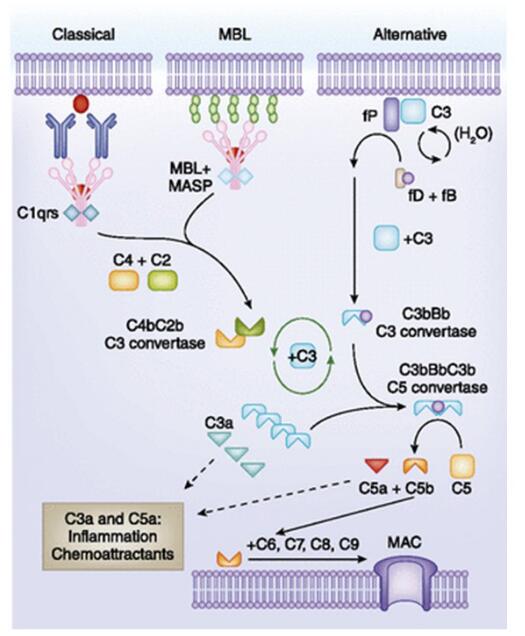The complement system plays an essential role in chronic, autoimmune and infectious diseases. It contains a group of proteins that when activated lead to target cell lysis and facilitate phagocytosis through opsonization. This system of plasma proteins can be activated directly by pathogens or indirectly by pathogen-bound antibody, leading to a cascade of reactions involving more than 35 proteins that occurs on the surface of pathogens and generates active components with various effector functions.
There are three pathways of complement activation, namely the classical, the alternative and the recently discovered MB-lectin pathway. To study the functional activity of complement pathways, labelled antibodies specific for neoantigen produced as a result of complement activation are used to measure the presence of complement components. If a complement component is absent, the total complement activity will be zero; if one or more components of the classical pathway decreas, the activity will be down-regulated.
Profacgen provides a complete solution for complement function assays. The highly sensitive assays enable determination of specific activity of each of the three pathways separately without interference from the others. With years of experience, our in-house laboratory services have been developed to perform in compliance with GLP, GCP and ISO 17025, ensuring that regulatory requirements are met. A comprehensive menu of markers for complement function and activation is available, as well as test packages for assessment of complement deficiencies and complement function. Profacgen provides complement function assays for various applications in drug development and clinical research:
Features
Assay Services
Reference
1. Mathern, D.R., Heeger, P.S. (2015) Molecules great and small: The complement system. Clinical Journal of the American Society of Nephrology. 10 (9): 1636-1650.
 Figure 1 Overview of the complement cascade.
Figure 1 Overview of the complement cascade.
Fill out this form and one of our experts will respond to you within one business day.